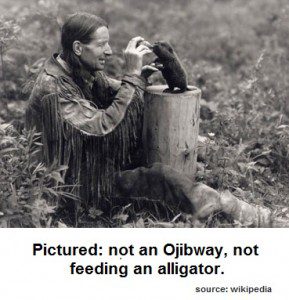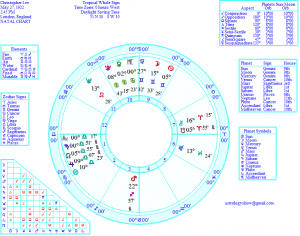 Reading about the recent case of Spokane NAACP President Rachel Dolezal and the various loud and heartfelt opinions held by people in regard to this matter has helped reinforce three concepts I strongly believe in:
Reading about the recent case of Spokane NAACP President Rachel Dolezal and the various loud and heartfelt opinions held by people in regard to this matter has helped reinforce three concepts I strongly believe in:
– Race is ultimately an artificial construct, one of those things that everyone thinks can be recognized but in fact has surprisingly little if any verifiable basis scientifically.
– Race is nonetheless a very real and especially important issue, especially in America.
– It is entirely possible for an intelligent person to hold two conflicting viewpoints about a subject at the same time, and for an intelligent person to throw up their hands and admit “I don’t get it dude.”
This is an astrology blog, so I’m not about to go waving around my ideas on race relations — although long term readers of this blog know I have good reason to if I wanted to. After all, I lecture my students about how it’s important to see the person who arises from the chart, not filter your view of the chart through your own preconceptions.
So rather than invoke any of my usual “let people be who they want to be” approach that I recently used in the case of Caitlyn Jenner… and no, I personally do not think there is any real parallel between Caitlyn Jenner and Rachel Dolezal… I am going to simply focus on the astrology. Specifically, I will be doing this by comparing factors in her chart to those of a couple of people you may have not heard of before, but who managed to achieve some degree of fame by being a member of an ethnicity there weren’t really a member of.
***
Once upon a time, there was a groundbreaking Ojibway-Canadian author and advocate for nature named Gray Owl. Except that as it turns out — Grey Owl wasn’t Ojibway at all: he was born in England and only adopted his new identity after moving to Canada as a young man. Normally this is the sort of story that would have vanished into history and not have gotten anyone’s attention, except that Grey Owl became famous in his native (pun?) England as a conservationist – one of the first people who could truly wear that title.
Or consider the case of one of the hottest popular authors in New Age circles in the 1960s and 70s: an exiled Tibetan monk named T. Lobsang Rampa. He popularized many facets of Tibetan life, the Tibetan struggle against the Chinese, and many New Age and spiritual concepts that would become big in the following decades. He wrote about these things in an entertaining and informative manner. If you’ve read many “New Age” books, you’ve probably read plenty worse yourself in your day. That would be all fine and well if it weren’t for the fact that it turns out that Lobsang Rampa was in fact Cyril Hoskins, an unassuming plumber from England.
Although I am at risk of falling into the trap I warn my students about when it comes to seeing what you want to see in a birth chart, one distinct similarity between these three stands out to me: a strong Moon-Neptune aspect involving the Mutable Signs.
Here’s the birth data if you want to play along. Unfortunately there are no times of birth for any of them, so I’ve followed the standard practice of going by the Noon chart.
Rachel Dolezal: November 12 1977, Lincoln Montana
Grey Owl: September 18, 1888, Hastings England
Lobsang Rampa: April 8 1910, Plympton England
These are three fairly diverse charts, but the Moon/Neptune/Mutable signature seems to apply:
Rachel Dolezal: Moon in Sagittarius (Mutable) conjunct Neptune
Grey Owl: Moon in Pisces (Mutable, ruled by Neptune), square Neptune-Pluto conjunct in Gemini (Mutable)
Lobsang Rampa: Moon in Pisces (Mutable, ruled by Neptune), trine Neptune
So that’s the astrology of it, at least what little we have in these three cases without a time of birth.
Sometimes astrology is capable of raising questions that it can’t answer. Like, in this case? Moon-Neptune aspects can greatly increase empathy for others, even those very different from us. It can make a person compassionate and can lend acting ability. But what tipped these three people over the edge into actually becoming someone very different? I suspect that saying “self loathing” or “poor self esteem” or “personal gain” are entirely too simple to be adequate answers. In fact, a Moon-Neptune trine is the closest aspect in my birth chart, and I have always stuck to my Grandmother’s advice, which was “Always be yourself. Never lie about your roots just to make yourself sound more interesting.”
She was a Romulan, by the way.
If Grey Owl did the world a great deal of good pretending to be a native Canadian, where’s the harm? If Rachel Dolezal made Spokane a better and more inclusive place for all people, does it matter what she thinks she is? Lobsang Rampa did a great deal to publicize the fate of the Tibetan people. Is that bad? Or: did Grey Owl subvert and apropriate the culture of an oppressed people for his own benefit? Did Rachel lie to get a scholarship to Howard University? Did Cyril Hoskins just claim to be inhabited by the spirit of a fictional Tibetan priest because no one would buy his books if he was just a plumber from England’s West Country?
I’m afraid that after much consideration, my answer to all the questions in the last paragraph is “ummm… I guess?”
To me, at least in part, the answer lies in a profound bit of wisdom that I learned a long time ago that I don’t think most people have ever fully considered. Ultimately, you are you. You are not your personality or your identity, and at least to some extent it is possible to take control of your personality and identity and make yourself more like what you truly want to be. Taking ownership of your own persona can be incredibly therapeutic and rewarding.
Of course doing that can also make you end up like this guy:
Ultimately, whether one is an astrologer or a conservationist or a plumber or whatever, I suspect its okay — and even sometimes entirely appropriate — to study a matter and still be willing to confidently say I just don’t get it dude. But, I sort of do get it.


